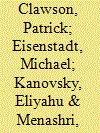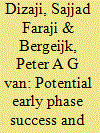|
|
|
Sort Order |
|
|
|
Items / Page
|
|
|
|
|
|
|
| Srl | Item |
| 1 |
ID:
005559


|
|
|
|
|
| Publication |
London, I B Tauris Pub., 1995.
|
| Description |
x,292p.
|
| Standard Number |
1850439052
|
|
|
|
|
|
|
|
|
|
|
|
Copies: C:1/I:0,R:0,Q:0
Circulation
| Accession# | Call# | Current Location | Status | Policy | Location |
| 036911 | 322.420955/RAH 036911 | Main | On Shelf | General | |
|
|
|
|
| 2 |
ID:
046706


|
|
|
|
|
| Publication |
Washington,DC, The Washington Institute for Near East Policy, 1998.
|
| Description |
viii, 114p.pbk
|
| Contents |
A Washington Institute Monograph
|
| Standard Number |
0944029272
|
|
|
|
|
|
|
|
|
|
|
|
Copies: C:1/I:0,R:0,Q:0
Circulation
| Accession# | Call# | Current Location | Status | Policy | Location |
| 045783 | 955.0543/CLA 045783 | Main | On Shelf | General | |
|
|
|
|
| 3 |
ID:
014314


|
|
|
|
|
| Publication |
Summer 1992.
|
| Description |
413-425
|
|
|
|
|
|
|
|
|
|
|
|
|
|
|
|
| 4 |
ID:
006324


|
|
|
|
|
| Publication |
New York, St Martins's Press, 1994.
|
| Description |
ix, 243p.
|
| Standard Number |
0312121180
|
|
|
|
|
|
|
|
|
|
|
|
Copies: C:1/I:0,R:0,Q:0
Circulation
| Accession# | Call# | Current Location | Status | Policy | Location |
| 037994 | 320.955/ZAN 037994 | Main | On Shelf | General | |
|
|
|
|
| 5 |
ID:
124984


|
|
|
|
|
| Publication |
2013.
|
| Summary/Abstract |
In order to explain why successes of economic sanctions predominantly occur in the first two years of a sanction episode, we analyse the dynamic economic and political impact of an economic sanction. Our theoretical analysis of the dynamics of adjustment gives us two important results: firstly, the strongest impact in terms of utility forgone occurs in the initial phase of the sanction episode and, secondly, the long-term gain of compliance decreases during a sanction episode and is lower in the long run than acknowledged by the usual comparative static analysis. On both accounts we expect that sanctions have a higher probability of success in the early phase and a lower probability of success in the long run. Next we build a comprehensive set of vector autoregressive (VAR) models that we apply to the case of a boycott of Iranian oil. An important innovation is that we include both economic and political factors in a VAR model of economic sanctions. Our VAR models find significant impacts of economic sanctions both on key economic variables (government consumption, imports, investment, income) and on two indicators of the political system (the Polity variable that describes shifts in the autocracy-democracy dimension and the Vanhanen Index of Democratization that describes political competition and participation). The impact of an oil boycott on the Iranian economy is considerable: oil and gas rents are important drivers of the Iranian key macroeconomic variables and ultimately of its political system. A reduction of oil and gas rents creates economic costs that act as incentives to move towards a more democratic setting. However, this effect is only significant in the first two years and turns negative after six to seven years, as adjustment of economic structures mitigates the economic and political impact of the sanctions.
|
|
|
|
|
|
|
|
|
|
|
|
|
|
|
|
|
|
|
|
|